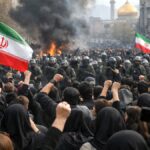
Second China-América Latin Round Table Notes on Human Rights-or Western Cynicism in Check
While the West insists on maintaining its moral monopoly on human rights, the second Latin and Caribbean Round Table reveals the wear and tear and hypocrisy of this hegemonic narrative. In a scenario marked by wars, televised genocides and unilateral impositions, the global south emerges seeking to build its own agenda. The event is an invitation to question and an effort to build alternatives for development and articulation beyond dominant paradigms.
1. The New World Order discusses the direction of global governance.
I was at the second Round Table China-Latin American and Caribbean Human Rights, held on the 25th in São Paulo, organized by the Chinese Society of Human Rights Studies (CSHRs), Renmin University of China (RUC) and São Paulo State University (UNESP). The event brought together representatives from 20 countries in a joint effort to rediscuss the paths of global governance in human rights from an optic not protected by the West. This is the first global southern event with this ambition: to build, in common, its own agenda, rooted in national realities and respect for sovereignty-that is, what China has called Shared destination community.
This concept expresses the idea that all countries, despite their differences, are interconnected and should cooperate to face global challenges such as poverty, climate change, conflicts and inequalities. This, of course, is not done by using the strength or imposition of institutional models.
This year, one of the central themes was the role of digital tools in the promotion of human rights, a subject directly connected to my doctoral research. Three major challenges were pointed out for the present and the digital future:
- Guarantee human rights in the virtual environment;
- Establish ethical and regulatory principles capable of containing harmful applications of technologies, especially those that reinforce inequalities or compromise fundamental rights;
- Combat algorithmic discrimination.
It should be noted that, in the West, the Big Techs US has determined the paths and uses of digital spaces, shaping algorithms, capturing data and instrumentalizing their marketing purposes.
China has advocated less unequal global digital governance based on technological sovereignty and international cooperation. Lula’s agreements in Beijing in May this year point to this same direction. In the technological field, Brazil and China signed memorandos on intellectual property, artificial intelligence, digital economy and geographical indications, as well as partnerships with Apexbrasil, IBGE and the Ministry of Communications.
The creation of a Center of Technology Transfer Set and the declaration of intent for sharing space data with Latin American and Caribbean countries – initiatives that reinforce a cooperation model based on exchange, autonomy and mutual respect, without political impositions or political conditionalities.
Another recurring point was the defense of sovereignty as a condition for human rights. The countries present insisted that it is not possible to guarantee any right when the territory is occupied, when there are unilateral sanctions, or when an external model under threat, blackmail or war is imposed.
Obviously, the colonial experience of many Latin American and Caribbean countries, as well as the memory of foreign invasions suffered by China, form a common background for this criticism. Recognition of global inequality as an inheritance of a colonial system was not treated as rhetoric, and rather as a basis for any new human rights paradigm.
The agenda also addressed the need to rethink international human rights governance. Today, many of the multilateral organisms have been emptied of meaning when captured by political and asymmetrical interests. The final document of this forum, appointed as “Consensus of São Paulo”defends:
- One genuine multilateralismwith equal votes between countries;
- O UN Strengthening;
- The construction of more fair, transparent and inclusive mechanisms.
Instead of the politicization of human rights, it is integrate civil and political rights with economic, social and cultural rights. That is, rights are historical and political constructions, and do not exist in a vacuum. Nor freedoms (such as expression or organization) are on the sidelines of concrete conditions that transcend contexts of hunger, unemployment and insecurity. Speaking of democracy ignoring the right to development and self -determination is a distortion.
2. Gaza wide the cynicism of the hegemonic order.
Given Gaza’s situation, the complaint was unable: We are witnessing a genocide in real timewith active support or conniving silence of Western powers that claim to defend themselves human rights.
In Gaza, hundreds of people die daily, with more than 55,000 officially registered dead. It is, as many have already pointed out, First televised genocide in historydisplayed in real time in the face of an international community that chooses to watch.
The Government of Israel, with the support of the United States-which vetoed on June 5 another resolution of the UN Security Council asking for immediate ceasefire-continues to promote the death of Palestinians by different means, including the deliberate obstruction of humanitarian aid.
Ironically, the same who, through the mainstream western media, shout over “genocide” in Tibet and Xinjiang. Let’s go to the data:
- Tibet: In 1953, the population was about 1.15 million; In 2020, it reached 3.64 million.
- Xinjiang: In 1953, it was 4.87 million; By 2021, it exceeded 12 million.
Not just demography, but economic and social indicators point to the development of these regions. To illustrate:
- In 1949, the life expectancy in Xinjiang was 30 years; Today, it’s 74.4 years.
- In Tibet, he jumped 35 years to 70 years.
That narrative selectivitywhich serves well -defined geopolitical interests, reveals more about who propagates it than about the facts it claims to denounce.
This event, for everything it represented, puts in check the Western moral monopoly about the agenda of human rights. The old center of the world system today is faced with crises:
- Political institutions captured by plutocracy;
- Growth of social polarization;
- Stem of the social fabric and hyperindidualism.
The rise of the global south is demographic, economic, but also politicalso that they forged understandings and conceptions to account for their concrete realities – without external prescriptions or interventions.
- Document “Consensus of São Paulo”
https://en.humanrights.cn/2025/07/26/e35153d3cea24e9faf379b66332d8231.html - Population data from Tibet (1953)
https://pubmed.ncbi.nlm.nih.gov/12321528/ - Population data from Tibet (2020)
https://www.ceicdata.com/en/china/population-sample-survey-by-region/population-tibet - Xinjiang population data (1953)
https://www.eastwestcenter.org/sites/default/files/private/EWCWwp001.pdf
Source: https://www.ocafezinho.com/2025/07/28/isis-paris-maia-quando-a-moral-do-ocidente-tropeca-em-gaza/

